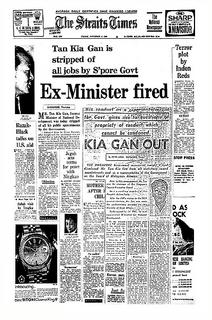 Tan Kia Gan was the Minister for National Development until he lost the 1963 elections.
Tan Kia Gan was the Minister for National Development until he lost the 1963 elections.While a director on the board of Malaysian Airways, Tan took strong objection to the purchase of Boeing aircraft. A few days later, a Mr Lim, a business friend of Tan, contacted First National City Bank, Boeing's bankers, to offer his services for a consideration. The bank knew of the Government's strict stand against corruption and reported the matter. Lim refused to implicate Tan Kia Gan and Tan could not be prosecuted.
But then Prime Minister Lee Kuan Yew was convinced Tan was behind it, and issued a statement to say that, as the Government's representative on the board of Malaysian Airways, he had not discharged his duties beyond reproach. He was removed from the board and from all his other appointments.
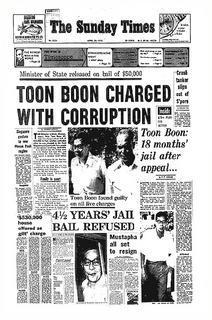 Wee Toon Boon was Minister of State in the Ministry of the Environment in 1975 when he took a free trip to Indonesia for himself and his family members, paid for by a housing developer on whose behalf he made representations to civil servants. He also accepted a bungalow worth $500,000 from this developer and took two overdrafts totalling $300,000 in his father's name against the personal guarantee of the developer, to speculate in shares.
Wee Toon Boon was Minister of State in the Ministry of the Environment in 1975 when he took a free trip to Indonesia for himself and his family members, paid for by a housing developer on whose behalf he made representations to civil servants. He also accepted a bungalow worth $500,000 from this developer and took two overdrafts totalling $300,000 in his father's name against the personal guarantee of the developer, to speculate in shares.He was charged, convicted and sentenced to four years and six months in jail. Upon appeal, the convictions were upheld but the sentence was reduced by 18 months.
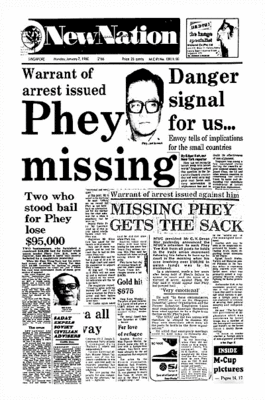 In December 1979 Phey Yew Kok, President of the NTUC and a PAP MP, was charged on four counts of criminal breach of trust involving a total sum of S$83,000.
In December 1979 Phey Yew Kok, President of the NTUC and a PAP MP, was charged on four counts of criminal breach of trust involving a total sum of S$83,000.He was also charged on two counts under the Trade Unions Act for investing $18,000 of trade-union money in a private supermarket without the approval of the minister. As was normal in such cases, he was released on bail, but unusually he was not asked to surrender his passport.
Devan Nair, as Secretary-General of the NTUC, was close to Phey Yew Kok and believed in his innocence. He wanted the CPIB to review the case, saying that an innocent man was being destroyed on false charges. But after he read the evidence shown by the CPIB in confidence, Devan did not pursue the matter further.
Phey Yew Kok decided to jump bail, and his two sureties lost their $50,000 deposit. Some say he was last heard of in Thailand, eking out a miserable existence as a fugitive, others claim he is operating a transport company in Taiwan.
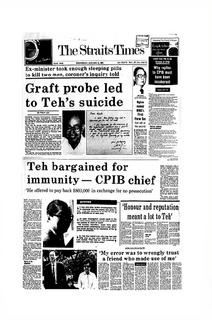 The most dramatic catch was that of Member of Parliament Teh Cheang Wan, then Minister for National Development, who once threatened to withhold emergency lift services from HDB wards that fail to vote for the ruling party.
The most dramatic catch was that of Member of Parliament Teh Cheang Wan, then Minister for National Development, who once threatened to withhold emergency lift services from HDB wards that fail to vote for the ruling party.In November 1986, one of his old associates admitted, under questioning by the CPIB, that he had given Teh two cash payments of $400,000 each, in one case to allow a development company to retain part of its land which had been earmarked for compulsory government acquisition, and in the other, to assist a developer in the purchase of state land for private development. These bribes had taken place in 1981 and 1982.
Teh denied receiving the money and tried to bargain with the senior assistant director of the CPIB for the case not to be pursued.
A week later, on the morning of Dec 15, Teh took a massive overdose of sodium amytal. Teh preferred to take his life rather than face disgrace and ostracism.
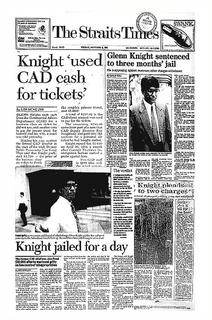 In 1991, the Director of the Commercial Affairs Department (the anti-graft and investigative arm of the Ministry of Finance) and former public prosecutor Glenn Knight Jeyasingam was charged in the subordinate court before District Judge Alfonso Ang. He pleaded guilty and was sentenced three months imprisonment for two offences.
In 1991, the Director of the Commercial Affairs Department (the anti-graft and investigative arm of the Ministry of Finance) and former public prosecutor Glenn Knight Jeyasingam was charged in the subordinate court before District Judge Alfonso Ang. He pleaded guilty and was sentenced three months imprisonment for two offences.The first charge made was essentially that Jeyasingam did attempt to cheat Managing Director of Trans-Island Bus Services Ltd Ng Ser Miang, with the intention of inducing Ng to effect an investment of Singapore $3 million in the Batam Island Fantasy Resort.
The second charge essentially was that Jeyasingam, did knowingly use, with intent to deceive the Ministry of Finance, a vehicle invoice of Ching Dtien Company, to mislead into the granting of a government vehicle loan of $65,000.
Jeyasingam joined the Attorney General's Chambers on April 3 1970 and reached the position of Senior State Counsel. On October 16 1984 he was appointed director of CAD, responsible for the setting up of the department for the investigation and prosecution of commercial crimes. In 1989 he received a strong commendation from the Minister of Finance for outstanding leadership in setting up CAD, and in 1990 he was awarded the Public Administration Medal (Gold).
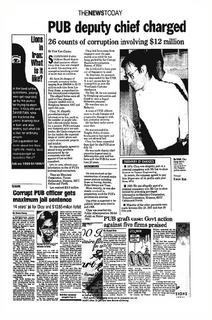 In 1995, a senior Public Utilities Board (PUB) official was given the maximum 14 years jail and ordered to forfeit US$9.8m received as bribes in Singapore's biggest corruption case. The sentence is the longest, and the kickbacks accepted by Choy Hon Tim from local and foreign contractors over a period of 18 years, a record high, judging from past corruption cases. Choy, the former Deputy CEO of PUB received the money through former PUB clerk Lee Peng Siong who had been an Australian citizen since 1983. Lee who was a consultant to PUB paid the money for pre-received information on the PUB tenders. The scandal resulted in the barring for 5 years five well-known contractors implicated in the bribery - Britain`s BICC, Siemens, Pirelli, and Japan's Marubeni Corporation and Tomen Corporation. The ban came when BICC announced planned to expand its operations in Asia with a US$31m investment in Indonesia and the Philippines. Lee, who was promised immunity from prosecution, remained free in Australia.
In 1995, a senior Public Utilities Board (PUB) official was given the maximum 14 years jail and ordered to forfeit US$9.8m received as bribes in Singapore's biggest corruption case. The sentence is the longest, and the kickbacks accepted by Choy Hon Tim from local and foreign contractors over a period of 18 years, a record high, judging from past corruption cases. Choy, the former Deputy CEO of PUB received the money through former PUB clerk Lee Peng Siong who had been an Australian citizen since 1983. Lee who was a consultant to PUB paid the money for pre-received information on the PUB tenders. The scandal resulted in the barring for 5 years five well-known contractors implicated in the bribery - Britain`s BICC, Siemens, Pirelli, and Japan's Marubeni Corporation and Tomen Corporation. The ban came when BICC announced planned to expand its operations in Asia with a US$31m investment in Indonesia and the Philippines. Lee, who was promised immunity from prosecution, remained free in Australia.
